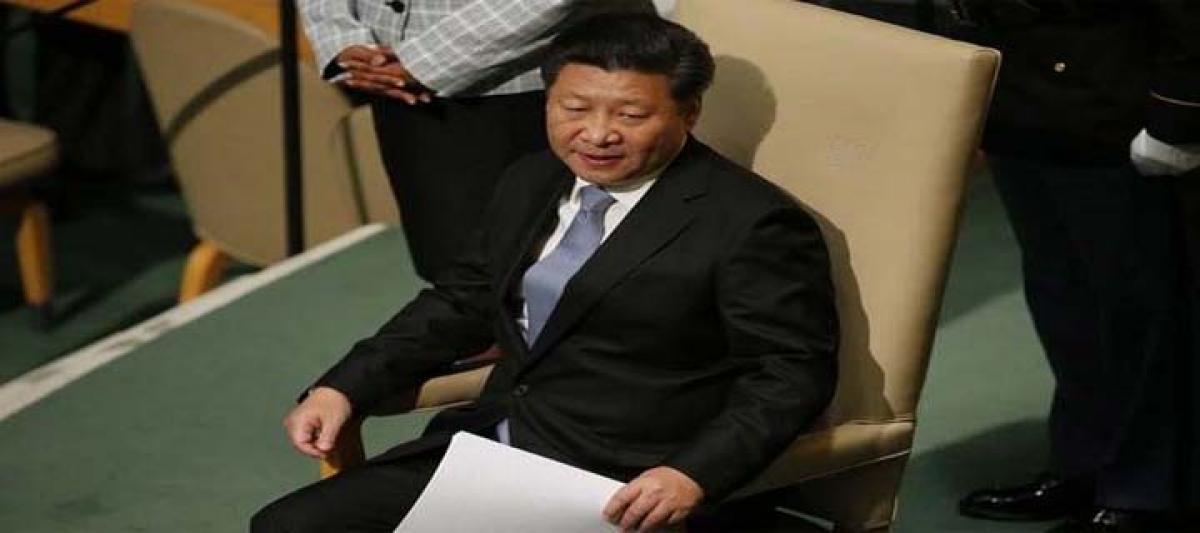Live
- Andhra: Actor Posani booked for derogatory comments against Chandrababu Naidu
- Integrating ML Models into Web-based and Mobile Applications For Real-time Data Analysis and Decision-making
- Sharana sahitya will endure as long as human society exists, opines MP Basavaraj Bommai
- Geetesh Sanodia Drives User Success with Comprehensive Training Programs Using Digital Adoption Platforms like WalkMe and Apty
- Udhayanidhi Stalin And EPS Clash Over Naming Schemes After Karunanidhi
- Sachin Mittal: A Journey from Entertainment to Wedding Excellence
- Bihar CM keeps up his promise, attends wedding festivities of PSO’s son in Haryana’s Rewari
- Fareed Zakaria On Modi's Historic Third Term Amid Global Anti-Incumbency Trend
- Jhansi Fire Tragedy: Father Rescues Seven Infants But Loses Twin Daughters
- Indian Air Force Commanders’ Conference Focuses On Operational Preparedness Amid Border Challenges
Just In

x
Highlights
Chinese President Xi Jinping begins a four-day visit to Britain on Tuesday in which human rights issues are to be eclipsed by lavish ceremony and hardnosed business talk heralding a \"golden era\" in ties.
Chinese President Xi Jinping begins a four-day visit to Britain on Tuesday in which human rights issues are to be eclipsed by lavish ceremony and hardnosed business talk heralding a "golden era" in ties.
.jpg)
An Asian superpower with deep pockets and international ambitions on one side and a European financial hub keen on attracting investment on the other the scene is set for a UK-China love story.
But Prince Charles will not attend an official banquet hosted by Queen Elizabeth II in what is being seen as a snub by the Dalai Lama-friendly heir to the throne.
And Jeremy Corbyn, the outspoken new leader of the opposition Labour Party, could also ask Xi some tough questions about dissidents and media censorship.
But these concerns are likely to remain secondary as Britain rolls out the red carpet for Xi, who will get a carriage ride to Buckingham Palace and will address British parliamentarians at the Houses of Parliament.
Xi is bringing along a retinue of bankers and businessmen which could include Jack Ma, the founder of Chinese e-commerce giant Alibaba, and a string of contracts are expected to be signed during the visit.
The state visit is the first since then-president Hu Jintao came in 2005 and both British Prime Minister David Cameron and China's ambassador to London, Liu Xiaoming, have said it will herald a "golden era" in relations.
Britain "is becoming the leader in Europe and indeed in the West" in its relations with China, Xiaoming said, while Cameron lauded increased trade ties.
"We encourage investment, and China is investing more in Britain now than other European countries," Cameron told Chinese state television.
Chasing 'China money'
Economics professor Ivan Tselichtchev, an expert on Asia, said burgeoning relations between the two countries are led by a business rationale.
"The UK is effectively the only European country showing a strong political will to attract 'China money' into infrastructure projects," he said.
"In broader terms, perhaps more than any other major developed nation, the UK values the business dimension in its relationship with Beijing."
Chinese sovereign wealth funds, state enterprises and, increasingly, private companies are buying up British firms and land, creating joint ventures with local partners or setting out on their own in Britain a bridgehead to continental European markets.
Michael Gestrin, an economist at the Organisation for Economic Co-operation and Development (OECD), has calculated that China has accounted for some $70 billion (62 billion euros) in mergers and acquisitions in Britain since 2008.
Some of China's purchases have been striking on a symbolic level like the takeover of the company that makes traditional London taxis.
But investments in infrastructure are more impressive and promise to grow further.
Between 2015 and 2025 China could invest £105 billion (141 billion euros, $162 billion), including in energy, property and transport, said Danae Kyriakopoulou from the Centre for Economics and Business Research in London and the co-author of a report on Chinese investments.
'Low-hanging' fruit
"Following the victory of the Conservative Party in the May 2015 general election, infrastructure investment has once again been identified as a top policy priority given the UK's big deficit in infrastructure assets resulting from chronic under-investment," she said.
"The country's northern regions should serve as particularly attractive propositions for investment given that the 'low-hanging' fruit in terms of infrastructure investment there have not been reaped in the same way as in the south," she said.
China has already made some investments including in Manchester airport, from which Xi will depart on Friday after a visit to Manchester City football club.
Reflecting Britain's needs in the area, finance minister George Osborne during a recent visit to China announced a giant tender for a high-speed train line linking London to northern England.
The burgeoning relations are controversial for some, with The Economist magazine saying Britain was "sleepwalking" into relations with China, while the Daily Telegraph newspaper said there was "an awful lot of kowtowing to Chinese sensitivities and interests".
The criticism has done little to dissuade business.
In the property market, three years after buying the London headquarters of Deutsche Bank, China is eyeing the ongoing boom and the highlight of the visit in business terms could be a deal between French company EDF and its Chinese partners to build a new nuclear power plant at Hinkley Point in southwest Britain.
China could also further its ambitions to internationalise its currency, the renminbi.
Among the possible deals planned during the visit is one for the first issuing of Chinese sovereign debt in renminbi outside of China.

Next Story
More Stories
ADVERTISEMENT
© 2024 Hyderabad Media House Limited/The Hans India. All rights reserved. Powered by hocalwire.com







